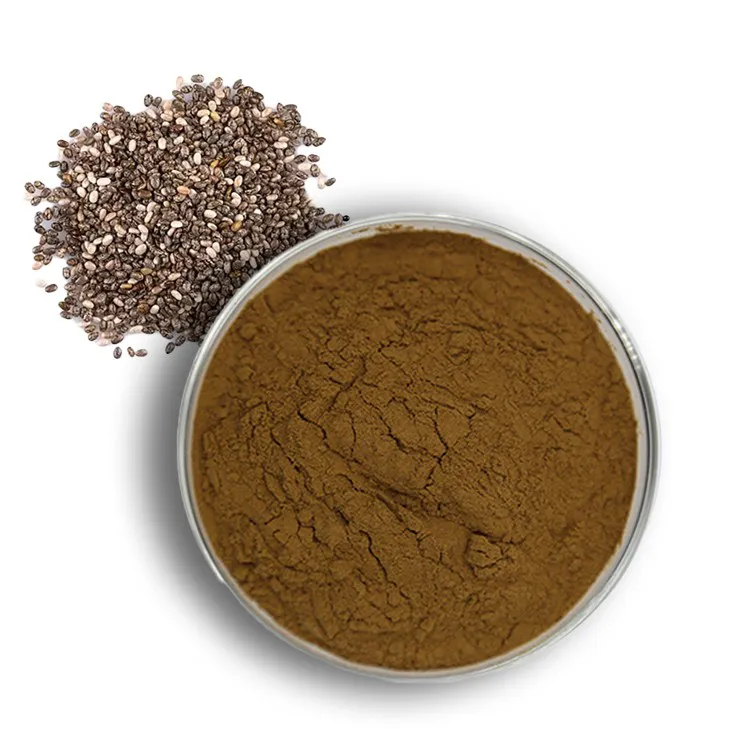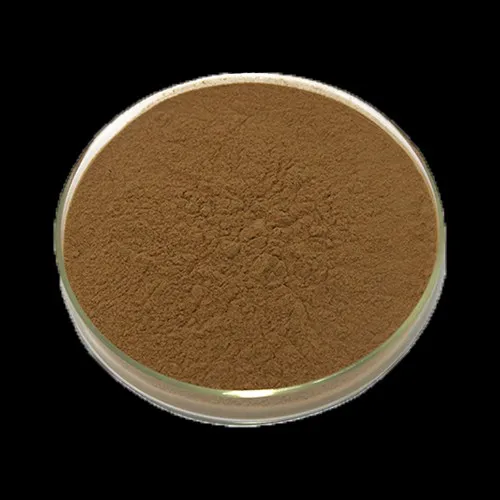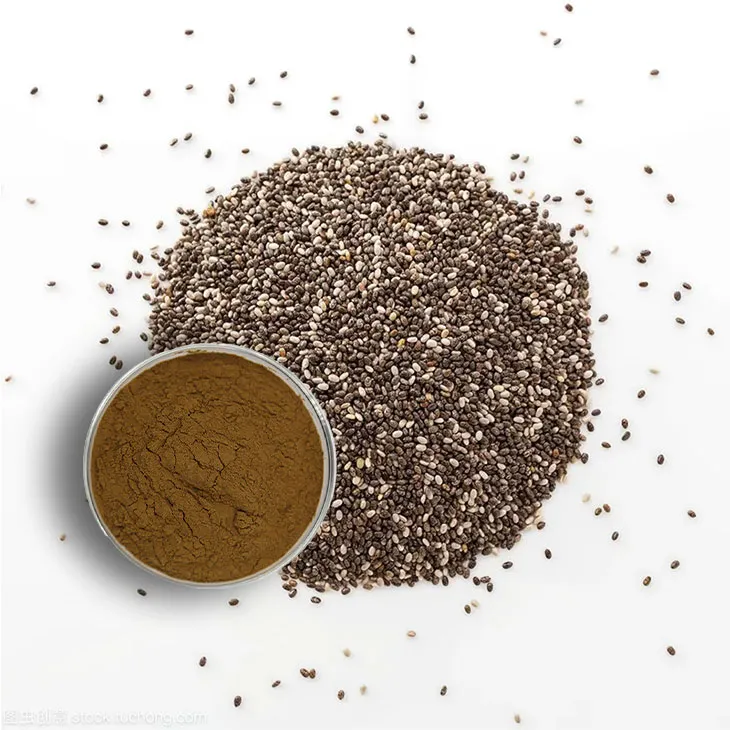- 0086-571-85302990
- sales@greenskybio.com
Best Answers to 7 Key Questions about Chia Seed Powder
2024-12-14

1. What are Chia Seeds?
Chia seeds are small, oval - shaped seeds that come from the Salvia hispanica plant, native to Central and South America. They have a long history of use in traditional Aztec and Mayan diets. These tiny seeds are a nutritional powerhouse, packed with fiber, protein, healthy fats, and a variety of vitamins and minerals.

2. How is Chia Seed Powder Made?
Chia Seed Powder is made by grinding whole chia seeds into a fine powder. This process is relatively simple and can be done at home using a high - powered blender or a coffee grinder. However, commercially available Chia Seed Powder is typically produced under controlled conditions to ensure consistency in particle size and quality.

3. What are the Nutritional Benefits of Chia Seed Powder?
High in Fiber: Chia seed powder is an excellent source of dietary fiber. Fiber is important for digestive health as it helps to keep the digestive system regular, preventing constipation. It also aids in controlling blood sugar levels by slowing down the absorption of carbohydrates.
Rich in Protein: For those looking for plant - based protein sources, chia seed powder is a great option. The protein in chia seeds can help with muscle repair and growth, and it also provides a feeling of fullness, which can be beneficial for weight management.
Healthy Fats: Chia seeds are rich in omega - 3 fatty acids, which are known for their heart - healthy benefits. These fats can help reduce inflammation in the body, lower blood pressure, and improve cholesterol levels.
Loaded with Vitamins and Minerals: Chia seed powder contains vitamins such as vitamin A, C, and E, as well as minerals like calcium, magnesium, and potassium. These nutrients play important roles in maintaining overall health, from strong bones to a healthy immune system.

4. How Can You Incorporate Chia Seed Powder into Your Diet?
In Smoothies: One of the easiest ways to add chia seed powder to your diet is by adding it to smoothies. Just blend a spoonful of chia seed powder with your favorite fruits, vegetables, and a liquid such as almond milk or water. The chia seed powder will add a nutritional boost without significantly altering the taste.
In Baked Goods: Chia seed powder can be used as a substitute for some of the flour in baking recipes. It can add moisture and a nutty flavor to muffins, bread, and cookies. However, keep in mind that it may change the texture slightly, so some experimentation may be needed.
In Yogurt or Oatmeal: Sprinkle a bit of chia seed powder on top of your morning yogurt or oatmeal. As it sits, the chia seeds will absorb some of the liquid and create a gel - like texture, adding an interesting consistency and extra nutrition.
In Sauces and Dressings: Chia seed powder can be used as a thickening agent in sauces and dressings. Mix it with a little water first to form a paste, and then add it to your sauce or dressing. This can be a great way to make a healthier version of your favorite condiments.
5. Are There Any Precautions or Side Effects?
Choking Hazard: If chia seeds are not consumed with enough liquid, they can swell in the throat and cause a choking hazard. This is especially important to note when consuming chia seed powder, as it can clump together if not properly mixed. Make sure to drink plenty of water when consuming chia seed products.
Allergic Reactions: Although rare, some people may be allergic to chia seeds. Symptoms can include itching, swelling, and difficulty breathing. If you experience any of these symptoms after consuming chia seed powder, seek medical attention immediately.
Interference with Medications: Chia seeds are high in fiber, which can potentially interfere with the absorption of certain medications. If you are taking medications, it is advisable to consult your doctor before adding chia seed powder to your diet to ensure there are no interactions.
6. How to Store Chia Seed Powder?
Chia seed powder should be stored in a cool, dry place, preferably in an airtight container. Exposure to heat, moisture, and air can cause the powder to spoil more quickly. If stored properly, chia seed powder can last for several months. You can also store it in the refrigerator to extend its shelf life, especially in warmer climates.
7. Where Can You Buy High - Quality Chia Seed Powder?
Health Food Stores: Many health food stores carry a variety of chia seed powder products. These stores often focus on providing high - quality, natural products, and you may be able to find organic and non - GMO chia seed powder.
Online Retailers: There are numerous online retailers that sell chia seed powder. Shopping online gives you a wide range of options, including different brands, packaging sizes, and prices. However, it is important to read reviews and check the reputation of the seller before making a purchase.
Supermarkets: Some larger supermarkets also stock chia seed powder in their health food or natural products sections. While the selection may not be as extensive as in a health food store or online, it can be a convenient option if you need to pick up a small amount quickly.
FAQ:
Question 1: What are the main nutrients in chia seed powder?
Chia seed powder is rich in several important nutrients. It contains a significant amount of fiber, which is beneficial for digestive health. It also has omega - 3 fatty acids, which are good for heart health and reducing inflammation. Additionally, chia seed powder contains protein, vitamins such as B vitamins, and minerals like calcium, phosphorus, and magnesium.
Question 2: How can chia seed powder be incorporated into a daily diet?
There are numerous ways to include chia seed powder in your daily diet. One simple method is to add it to smoothies. It can also be mixed into yogurt or oatmeal for an extra nutritional boost. Another option is to use it in baking, for example, adding it to muffin or bread recipes. Some people even sprinkle it on top of salads for added texture and nutrition.
Question 3: Is chia seed powder suitable for people with dietary restrictions?
Chia seed powder can be a great option for many people with dietary restrictions. For vegetarians and vegans, it is an excellent source of plant - based protein. However, those with allergies to seeds should avoid it. Also, people taking certain medications, especially blood - thinning medications, should consult their doctor before consuming chia seed powder as it may interact with the drugs.
Question 4: What are the potential health benefits of consuming chia seed powder?
Consuming chia seed powder may bring multiple health benefits. Due to its high fiber content, it can help with digestion and promote regular bowel movements. The omega - 3 fatty acids may reduce the risk of heart disease. It may also help in managing blood sugar levels as it can slow down the digestion and absorption of carbohydrates. Some studies suggest that it may have a positive impact on weight management as it can increase satiety.
Question 5: How should chia seed powder be stored?
To maintain the freshness and quality of chia seed powder, it should be stored in a cool, dry place. An airtight container is recommended to prevent moisture and air from spoiling the powder. It can be stored in a pantry or a cupboard. If stored properly, chia seed powder can last for a relatively long time, usually up to a year.
Question 6: Are there any side effects of consuming chia seed powder?
While chia seed powder is generally safe for consumption, some people may experience side effects. Consuming large amounts of chia seed powder without sufficient water can cause digestive issues such as constipation or blockages in the digestive tract. Also, as mentioned before, it may interact with certain medications. So, it is important to start with a small amount and gradually increase the intake while monitoring your body's response.
Related literature
- The Nutritional Profile of Chia Seeds: A Comprehensive Review"
- "Chia Seeds and Their Impact on Health: Current Research Findings"
- "Practical Applications of Chia Seed Powder in Diet and Nutrition"
- ▶ Hesperidin
- ▶ citrus bioflavonoids
- ▶ plant extract
- ▶ lycopene
- ▶ Diosmin
- ▶ Grape seed extract
- ▶ Sea buckthorn Juice Powder
- ▶ Beetroot powder
- ▶ Hops Extract
- ▶ Artichoke Extract
- ▶ Reishi mushroom extract
- ▶ Astaxanthin
- ▶ Green Tea Extract
- ▶ Curcumin Extract
- ▶ Horse Chestnut Extract
- ▶ Other Problems
- ▶ Boswellia Serrata Extract
- ▶ Resveratrol Extract
- ▶ Marigold Extract
- ▶ Grape Leaf Extract
- ▶ blog3
- ▶ blog4
- ▶ blog5
-
Pure 85% Tomentil Extract.
2024-12-14
-
Angelica sinensis extract
2024-12-14
-
American Ginseng Root Extract
2024-12-14
-
Genistein
2024-12-14
-
Lavender Extract
2024-12-14
-
Moringa powder
2024-12-14
-
Curcumin
2024-12-14
-
Dandelion Leaf Extract
2024-12-14
-
Curcumin Extract
2024-12-14
-
Eucommia Ulmoides Extract
2024-12-14
-
Grape Seed Extract
2024-12-14





















